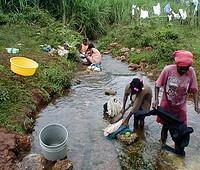Sustainable Security and Environmental Limits
Issues:Climate change, Competition over resources, Global militarisation, Marginalisation
“Sustainable security – A briefing for Friends“, has been co-produced by peace and security think tank the Oxford Research Group (ORG), Northern Friends Peace Board (NFPB) and Quaker Peace & Social Witness (QPSW) in order to stimulate discussion, reflection and action among Quakers.
Sustainable security is a paradigm that recognises we must work to tackle the causes of insecurity, not respond to it with attempts to control, often by military means. It is about curing the disease, rather than fighting the symptoms. The briefing identifies the major trends likely to cause large scale loss of life and security over the coming decades as:
• marginalisation of the majority world (the global South);
• climate change;
• competition over resources;
• global militarisation.
With respect to environmental limits, the briefing says the following;
The earth, which is abundant in natural and material resources, has been used to fulfil
the desires (some essential, some not) of the population that lives on it. Many of the
resources which have been exploited, such as fossil fuels, cannot be replaced; the extraction of others places habitats and ecosystems in danger; others produce damaging pollutants when used.
The treatment of the natural world by humankind has contributed towards the two
related major trends that are likely to drive insecurity in the coming decades: climate
change and competition over natural resources.
Climate change is high on the international political agenda. The likely and actual physical effects of these processes are well documented; the earth will be changed. Climate change will also have dramatic social and economic impacts. For example: a loss of, or damage to, infrastructure, shifts in disease patterns (e.g. spread of diseases like malaria and dengue fever, as the mosquitoes that transmit the infection are able to inhabit new locations because of changing temperatures), human crises as a result of more frequent extreme weather events such floods, water scarcity, and the mass displacement of peoples as some regions become uninhabitable. These trends could produce serious security consequences.
A closely related driver of insecurity is competition over resources. The planet is more heavily populated than ever, and today some populations are already consuming far more than their share of the planet’s resources. As population growth continues, there will be greater scarcity of resources including food, water and energy, particularly if consumption patterns also increase. Once major demographic changes and the effects of climate change are factored in, greater competition for such resources should be expected. This will have local and global effects, as those nations rich in natural resources become subject to competition between local populations and international corporations who wish to buy their resources for sale in other parts of the world.
Resource-conflict is already an issue: many anti-war activists cited oil as a cause behind the invasion of Iraq (central to the Persian Gulf, an oil-rich region) in 2003; water access is an ongoing source of tension between Syria, Lebanon, Jordan and Israel and the occupied Palestinian territories around the River Jordan basin; and in the same region, there are differences in how much water Israeli settlers and Palestinian inhabitants of the West Bank are able to access. The final example will relate in future also to climate change, as the Middle East is highly likely to suffer increased occurrences of drought. Competition will make some existing conflicts worse, and produce new struggles.
These two related environmental crises will disproportionately affect the poor, and further entrench marginalisation. The Climate Justice movement has been prominent in describing the injustice of this situation: it is the poorest that have contributed least to the greenhouse gas emissions that are catalysing climate change, yet they will suffer most because of it.
Read the whole briefing here.
The above illustrates the normative underpinnings of QCEA’s sustainable energy security programme, and may help people understand why Quakers, with a strong tradition in working for peace, justice and equality, are working on issues related to sustainability, and indeed, energy security. It is precisely because the issues of climate change and increased competition over resources, including energy, have such strong implications for peace, justice and equality, that they cannot be ignored. The political importance of energy (and more broadly, resource) security, at European level, is a strong driver of traditional, militaristic security concepts – where “our” security increases the insecurity of others. It is this concept that the Quaker Council for European Affairs, by emphasising sustainable energy security – a sustainability that recognises both environmental and social sustainability not just within Europe, but in the wider world – urges against.
Article source: Quaker Council for European Affairs
Image source: kretyen
 Delicious
Delicious Digg
Digg StumbleUpon
StumbleUpon Reddit
Reddit
Posted on 4/05/11

Comments
Post new comment